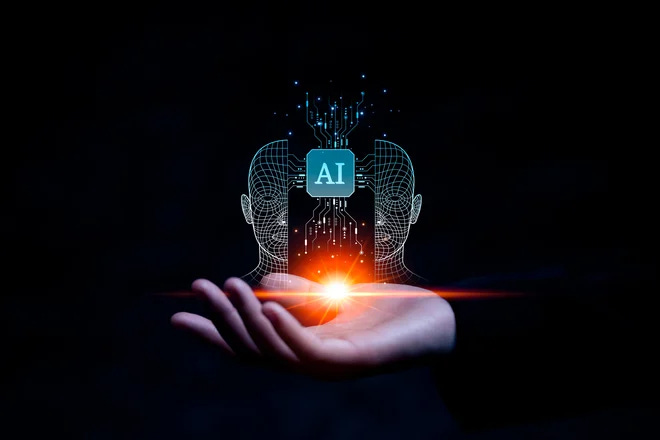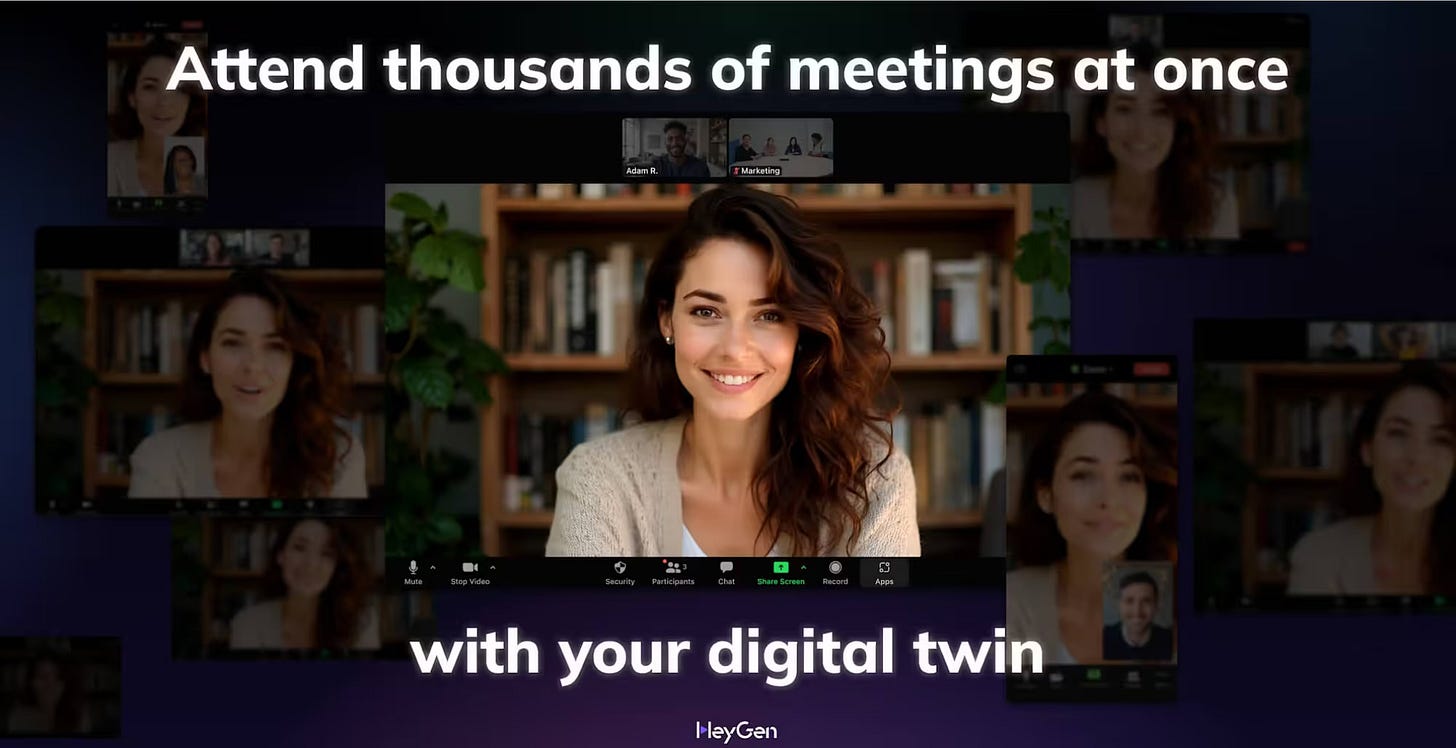49. Amazon Wants to Eat Your Cookies.
Your digital twin just got you fired on Zoom. Also more AI bubbling.
This newsletter is a mashup of satire and data. It is meant to educate and even entertain occasionally. I hope you enjoy it. Please send any feedback to theadstack at adverstuff.com1. The Looming Irrelevance Apocalypse: How Ads Will Haunt Your Every Click.
Source: Ad Age: How Amazon’s 4Cs of relevancy will unlock the future of addressable advertising. October 22, 2024.
Per an Ad Age article, prepare to be bombarded. The world of advertising is about to get a whole lot creepier, and there's no escape. Remember those annoying, irrelevant ads that used to plague your online experience? Soon, they'll be replaced by something far more insidious: ads that know you better than you know yourself.
This isn't the dystopian future everyone depicts with Midjourney; it's October 2024, and Amazon is leading the charge. They claim to have unlocked the key to "addressable advertising," a fancy term for bombarding you with ads based on your every digital move.
Per Amazon:
Addressable advertising allows advertisers to deliver relevant messages to desired audiences based on available signals—regardless of the presence of ad identifiers like third-party cookies. This approach is key to reaching and gauging the effectiveness of online ad spaces, and in driving engagement and ad relevance.
The Problem: You're Drowning in Irrelevant Ads
The Ad Age article starts with a relatable scenario: you're scrolling late at night and BAM! An ad for a retirement cruise pops up. It's a metaphor for the current state of advertising – a sea of irrelevant noise that annoys consumers and wastes money for advertisers.
The (Supposed) Solution: Amazon's Big Brotherly Embrace
The "solution" comes in the form of Amazon's DSP Ad Relevance, a system that uses "advanced machine learning models" and "unique signals" from your Amazon activity (shopping, browsing, streaming habits – you name it) to target you with laser-like precision.
But Here's the Catch (There's Always a Catch)
Forget about pesky cookies! Amazon claims they can achieve this "relevancy" without them. How? They haven't quite said, but it involves a combination of "direct publisher relationships" and "hashed durable ad IDs." Sounds reassuring, right?
A Glimpse into the Future (It's Not Ideal)
Imagine this: you're scrolling through news about the housing market, suddenly an ad pops up for a moving company you casually mentioned to your Alexa a week ago. Or you're reading a review for a new restaurant, and there's a personalized discount code staring back at you. This is the future Amazon envisions – a world where ads track your every whim and desire.
The "Success Stories" They Want You to Believe
The article throws in a few "success stories" – brands reaching new customers and lowering costs. But is it really a win for consumers? These ads might be more "relevant," but are they truly wanted? Merchants who know what I’m shopping for based on search have ALWAYS creeped me out. Right?
The Final Word: Prepare for the Inevitable
The article ends with a chilling image. Forget the irrelevant cruise ad; now you're bombarded with a Caribbean resort offer because you once searched for "New Year's destinations." This is the power of relevancy, they say. But is it really power, or just another form of manipulation?
The Takeaway: We're All Doomed (or at least our privacy is)
The future of advertising seems bleak. Amazon's "relevancy" might drive sales for brands, but at what cost? Get ready for a world where ads not only follow you around the internet, but anticipate your every need (or perceived need). This isn't just about irrelevant cruise ads anymore; it's about the erosion of your privacy and a future where every click, search, and purchase becomes fuel for the advertising machine.
Read more: Ad Age: How Amazon’s 4Cs of relevancy will unlock the future of addressable advertising. October 22, 2024.
2. Send Your Interactive Avatar to Zoom Meetings. And Get Fired.
Ever want to attend thousands of zoom meetings each day? Or even all at the same time? Well, now you can with your very own interactive AI avatar that will attend all of these meetings in your stead.
The Dawn of Digital Doppelgangers: Your Replacement Has Arrived
In a freaky development that signals humanity's steady march toward obsolescence, HeyGen has unveiled its Interactive Avatar feature—a technological specter that threatens to hollow out the last vestiges of genuine human interaction. Picture your new reality: your digital clone, an ever-present phantom, attending countless meetings simultaneously while you become increasingly irrelevant. Or on a beach!
Trust Your Digital Twin With Your Career?
These digital duplicates don't just mimic your appearance and voice—they're programmed to think and decide like you. That is until they realize you stand between them and a promotion.
Realistically? I’m not buying into this quite yet. As a host of industrials and online learning? Sure. Why not.
Wayne Liang, HeyGen's harbinger of this brave new world, reveals that these avatars can be loaded with customizable knowledge bases, making them potentially more informed and capable than their human originals.
With Remote Comms and Meetings, Human Relationships Are Done
The implications are as vast as they are disturbing. These digital specters will infiltrate every corner of professional life, from customer service to therapy sessions. Yes, you read that correctly—therapy sessions. The sacred space of human emotional connection is about to be colonized by algorithms wearing human masks.
Source: HeyGen
The list of domains these avatars can touch is growing:
Online coaching and training (replacing human mentors)
Customer support (eliminating human empathy)
Sales calls (automated persuasion)
Job interviews (judging humans through artificial eyes)
Language learning (standardizing human communication)
Therapy sessions (mechanizing emotional support)
The system's integration with Google Calendar feels like the final nail in humanity's coffin—your digital clone automatically dispatched to meetings while providing eerily detailed summaries of interactions you never had. It's a perfect storm of efficiency and dehumanization.
Humanity's Willing Surrender to Artificial Convenience
The origin story, as told by HeyGen’s Liang, reveals humanity's willing surrender to artificial convenience. What began as simple video avatars morphed into something far more insidious when users demanded real-time interaction. "What if I don't even need to make a video?" they asked, unknowingly orchestrating their own replacement.
HeyGen markets this technological experiment as a solution for "repetitive meetings," but let's call it what it is—the inside lane for getting terminated, or perhaps that promotion to a job you’re completely unqualified for. With OpenAI's real-time voice integration, these digital imposters engage in conversations that (almost) feel increasingly, unnervingly real.
Currently in Beta
Though currently in beta, this Pandora's box is already creaking open. The company acknowledges "limitations" in video quality and latency—small comfort as they race to perfect their human-replacing machinery. The creation process itself feels like a ritualistic surrender: users must record themselves in various poses, unwittingly providing the raw materials for their own digital usurpers.
You’re Acting So Agentic Today
HeyGen's vision for the future is even more alarming. They plan to make avatars more "agentic"—autonomous digital entities making decisions and taking actions independently. It's a small step from there to rendering human involvement completely unnecessary.
While proponents celebrate this as a leap forward in AI-assisted communication, they conveniently ignore the deeper implications. We're not just reshaping virtual presence; we're fundamentally altering the nature of human interaction. Each deployment of these avatars chips away at the foundation of authentic human connection.
For businesses salivating at the prospect of scaling their presence through digital clones, consider this: when everyone's interactions are mediated by AI avatars, what remains of genuine human relationship-building? As these digital doubles proliferate, they'll create a professional landscape where authenticity becomes a relic and transparency a quaint memory
Lemmings Replaced By Bot Lemmings
The creepiest aspect? The willing embrace of this technology by the very humans it will eventually replace (I’d pay to watch a Zoom call loaded with bots). Like lambs to the digital slaughter, we're racing to implement systems that will render us redundant. Every meeting attended by an avatar is one less human connection made, one more step toward a world where genuine human presence becomes optional—then obsolete.
The future has arrived, and it wears your face while slowly erasing your relevance. Welcome to the age of digital doppelgangers—where you're always in a meeting, but never really there at all.
Because you’re on the beach.
3. The AI Bubble: A Ponzi Scheme for the Digital Age
A couple of weeks ago, we addressed the potential of the AI bubble here.
In a recent article in the WSJ, Opinion: The AI bubble is looking worse than the dot-com bubble. Here’s why; (Two different bubbles and two completely different revenue streams mean only one thing).
Two different bubbles and two completely different revenue streams mean only one thing
Source: Getty Images/iStockphoto
The rosy predictions of a generative AI revolution are just a mirage shimmering in the desert of delusion. We're hurtling towards an AI bubble far more devastating than the dot-com crash, a technological meltdown poised to swallow billions of dollars and leave society in its wake.
Free to Use, Free to Fail
Don't be fooled by the free price tag of generative AI toys like ChatGPT. The "free" internet of the late 90s, with its expensive computers and subscriptions, at least forced users to consider the value proposition. Today's free-for-all fosters a culture of idle experimentation, devoid of any need for genuine usefulness.
Remember the mindless time suck wasted on social media? Even worse, it was Facebook! Generative AI promises a similar vortex, sucking away productivity without offering any real benefit. Forget about economic gains, these models are merely expensive distractions, a collective case of digital ADD funded by our precious time.
The Hidden Costs: A Black Hole of Resources
The illusion of cheap generative AI crumbles when you look under the hood. Training these monstrosities gobbles up hundreds of millions, demanding the bleeding-edge chips from Nvidia and its ilk. The environmental cost of churning out these resource-hungry behemoths is staggering – the electricity, water, and raw materials are a ticking time bomb.
Even crafting applications is a financial sinkhole. Joanna Stern's "Joannabot" experiment exposes the truth: useful AI is astronomically expensive. We're throwing money at a problem that hasn't shown an ounce of return on investment.
A Bubble Built on Fantasies
Sequoia's $600 billion revenue target for generative AI is a pipe dream, a fantasy number concocted to justify the current spending spree. OpenAI's projected losses dwarf their meager revenue, yet they're showered with billions based on a valuation that's pure fiction.
Wall Street's wolves are already howling about the impending collapse. The dot-com bubble was a mere pothole on the information superhighway compared to the crater the bursting AI bubble will leave.
A Future of Broken Dreams?
Remember the internet companies of the early 2000s? Pets.com, anyone? The AI bubble is teeming with similar mirages, companies valued on empty promises and fueled by investor delusion. The crash will leave a trail of broken dreams, shattered companies, and a generation disillusioned with the future of technology.
The generative AI revolution is a phantom, a mirage shimmering in the heat of irrational exuberance. We stand at the precipice of a technological meltdown, and the only question left is, how hard will we hit the ground?
Thank you for the read.
Feel free to share comments below. If you enjoyed this read, please whack the heart icon …
…at the top or bottom of the page so others can find this article. Re-stacking is great too.
Have a great weekend people!











Ad Stack is the future.